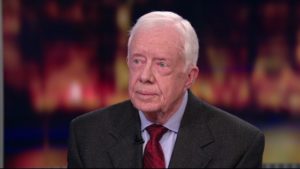
In wake of suggestions that the Carter Formula has outlived its usefulness, Opposition Leader Bharrat Jagdeo said he was willing to participate in meaningful discussions to develop a replacement.
A former Chief Elections Officer (CEO) of Jamaica compiled a report on the need for Guyana to redraft and modernise its electoral laws.
In that report, he argued that the Carter Formula was outdated and there was need for a new process.
Prompted for his views on such a contention, Jagdeo told reporters that the People’s Progressive Party (PPP) was open to partaking in discussions to bring about reforms.
Jagdeo added that any such changes would require constitutional reform, but given Government’s approach, such a process seemed far from becoming a reality.
“In this climate, it seems very difficult to predict that we will have those any time before the next elections,” Jagdeo observed.
Carter Formula
Guyana’s 1980 Constitution was amended to incorporate the Carter Formula, which was proposed by the Carter Centre, for the fair selection of the Chairman and Commissioners of GECOM.
The Formula outlined that the Opposition Leader submit a list of six nominees for the President’s consideration for the post of GECOM Chair.
The qualifications of the Chairman were also expanded to include “any other fit and proper person” in addition to ‘Judge-type’ individuals.
After the 1992 elections, this temporary amendment to the Constitution lapsed. However, for the Local Government Elections in 1994, the Constitution was then again temporarily amended, incorporating the Carter Formula for the purposes of the Local Government Elections, with one addendum: the list of names must not be “unacceptable” to the President.
The amended Carter Formula was used again in the 1997 elections, with the Constitution again being amended in 1995, capturing the Formula.
During the 1999-2001 constitutional reform process, the Carter Formula was eventually incorporated permanently into Article 161 of the Constitution by Act Number Two of 2000.
Change
The report, titled “Final Report on Redrafting and Modernising the Electoral Laws of Guyana”, said the erosion of confidence in GECOM is in part due to the failure of the Carter-Price Formula to enable decisions to be taken on a timely basis and with a measure of consensus.
The report proposed the adaptation of an independent Electoral Management Body (EMB), which would fix all the issues which the Carter-Price Formula fails to address.
The report said that the EMB approach avoided party nominees as Commissioners, and instead used a participatory format that entailed three levels of screening before the names of independent individuals were submitted to the President for formal appointment.
Constitutional reform
Although the A Partnership for National Unity/Alliance For Change (APNU/AFC) campaigned vociferously on the need for constitutional reform, it has seemingly lost interest in this process. At least, this is according to former Speaker of the National Assembly, Ralph Ramkarran, who penned his views in his weekly blog, “The Conversation Tree”.
The coalition had committed to the establishment of a Constitution Reform Committee with a mandate to complete consultations, draft amendments and present same to the National Assembly for approval within nine months. So far, Government has appointed a committee headed by Attorney and former AFC Chairman Nigel Hughes to examine the process for constitutional reform. While the committee presented its report to Government almost a year ago, no progress has since been seen.



